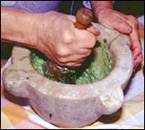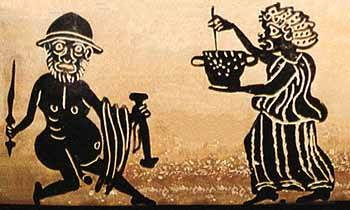|

|
Moretum
ac primum leviter digitis
tellure refossa
quattuor educit cum spissis alia fibris,
inde comas apii graciles rutamque rigentem
vellit et exiguo coriandra trementia filo. 90
haec ubi collegit, laetum consedit ad ignem
et clara famulam poscit mortaria voce.
singula tum capitum nodoso corpore nudat
et summis spoliat coriis contemptaque passim
spargit humi atque abicit; servatum ÝgramineÝ bulbum
95
tinguit aqua lapidisque cavum demittit in orbem.
his salis inspargit micas, sale durus adeso
caseus adicitur, dictas super ingerit herbas,
et laeva ÝvestemÝ saetosa sub inguina fulcit,
dextera pistillo primum fragrantia mollit 100
alia, tum pariter mixto terit omnia suco.
it manus in gyrum: paulatim singula vires
deperdunt proprias, color est e pluribus unus,
nec totus viridis, quia lactea frusta repugnant,
nec de lacte nitens, quia tot variatur ab herbis. 105
saepe viri nares acer iaculatur apertas
spiritus et simo damnat sua prandia vultu,
saepe manu summa lacrimantia lumina terget
immeritoque furens dicit convicia fumo.
procedebat opus; nec iam salebrosus, ut ante, 110
sed gravior lentos ibat pistillus in orbis.
ergo Palladii guttas instillat olivi
exiguique super vires infundit aceti
atque iterum commiscet opus mixtumque retractat.
tum demum digitis mortaria tota duobus 115
circuit inque globum distantia contrahit unum,
constet ut effecti species nomenque moreti.
|
|
| |
Moretum
First with his fingers he gently brushes
aside the earth and takes out four galic plants with strong stalks,
then he cuts some of celery's gracefull foliage and woody rue and coriander,
trembling on its tender stalk. As soon as he has got these things together,
he sits down near the joyfully crackling fire and loudly asks his servant
for the mortar. Then he removes the peelings from the garlic bulbs and
strows them round about on the floor; the cloves that emain, he washes
with a little water and puts them in the hollowed rock. he sprinkles
coarse salt on top, adds dried salted cheese and lays the herbs on top.
With his left hand he ties his tunic under his hairy belly and with
his right he crushes the fragrant garlic with the pestle, then he grinds
the rest equally fine and mixes it with the oozing sap. Little by little
the ingredients lose their own characteristics, the colours all flow
into one: not entirely green, because the milky white lumps resist that,
nor white as the milky origin, because it is altered by the green herbs.
Often the sharp smell attacks the man's nostrills and while pulling
his nose up he curses his lunch, every once in a while he wipes his
running eyes with the back of his hand and in a rage he flins his curses
at the innoccent fire. Meanwhile the work advances; no longer jolting
and jerking as before, but quite heavily the pestle turns its slow rounds.
At last he sprinkles on a few drops of olive oil and pours on a little
of vinegar's tang. He mixes the lot anew and takes it out of the mortar,
what looks like and may justly be called a moretum.

|
|
| |
Notes
Many of my predecessors have taken the quantities
of garlich that the poet speaks of litterally. Some came to the conclusion
that one can actually use fourty or more cloves of garlic, since past
ten cloves our sense of taste is immune to the remaining thirty. As far
as I'm concerned all this is not necessary. The poem is about a comical
picture of rural life and is therefor likely to indulge in exaggeration:
garlic is something rustic, lots of garlic is very rustic.
If you take about 5 oz. of pecorino, one clove of garlic will do, maybe
two if they are smallish. A fistfull of chopped celery and the same of
fresh coriander, of rue just a spoonfull is enough. A teaspoon if dried.
Grind the herbs thoroughly in the mortar, grate the cheese and mix with
the herbs, while adding a few drops of vinegar and enough olive oil to
make it into a smooth paste.
Eat it with unleavened bread, just as the farmer in this poem.
|
|